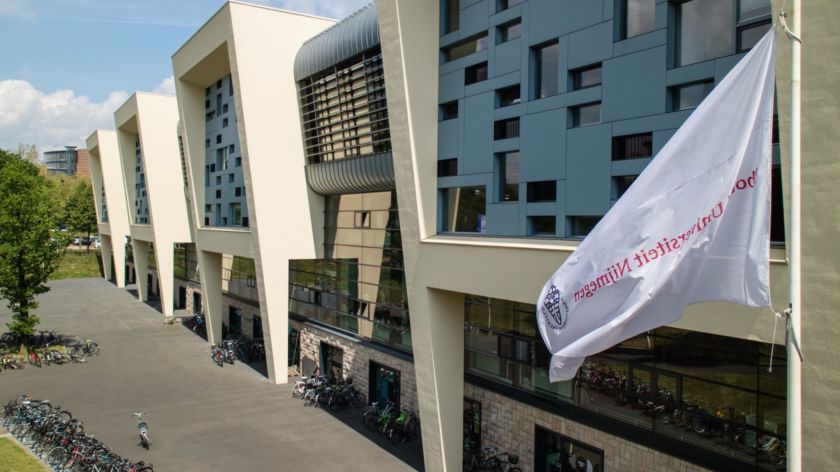Financial crisis at Management faculty: ‘The consequences for students will become visible this period’
-
 Het Elinor Ostromgebouw huisvest verschillende studentenorganisaties. Foto: Rein Wieringa
Het Elinor Ostromgebouw huisvest verschillende studentenorganisaties. Foto: Rein Wieringa
What will be the impact of the budget cuts at the Nijmegen School of Management on the quality of its education? That is the question that is causing great concern among employees and students. But despite this, members of the Faculty Student Council have yet to receive many complaints from their fellow students.
A 9-million-euro deficit. That was the amount that accountants of the Management faculty came up with earlier this academic year, after drawing up next year’s budget. This financial crisis is the result of a combination of issues – ranging from fast growth in the number of employees to inflation .
That is why the faculty introduced a set of measures in September with the goal of reducing the deficits. For instance, the faculty board announced a hiring freeze, student assistants lost their jobs, and the regulations for travel and declarations have been strongly refined.
Electives courses cancelled
According to the faculty board, the budget cuts won’t necessarily undermine the quality of education. However, that is a great concern for the Faculty Joint Assembly (FGV), consisting of students and employees. In November, they wrote in an advice paper that they are worried about more students in seminars, fewer assignments, and less room for personal feedback. Moreover, there will be less time available for thesis supervision.
As lecturers are no longer – or to a lesser degree– allowed to use external hiring for supervision and education, the first tangible consequences of the budget cuts are starting to emerge in education.
‘I expect to see more students coming to us in the upcoming period’
Another consequence is the cancellation of the elective courses ‘Safety Discussions in Europe’, ‘Conflict, Aid and Development’ and ‘Conflict and Governance in Africa’, which are normally offered by the Centre for International Conflict – Analysis & Management (CICAM).
That was very disappointing for some students, says chair Emma-Sophie Ekelmans of the Faculty Student Council (FSR), as they had to change their study schedule. ‘Fortunately, there are alternatives’, she adds. Students still have the opportunity to participate in two alternative conflict-related courses in the same period. ‘We hope that those courses will live up to their expectations.’
Workload
Despite the loss of the elective courses, the consequences for students are not that bad yet, according to FSR-secretary Sien Doreleijers. ‘Up to this point, we have not received any complaints about lecturers having too little time for thesis supervision, exams that have taken too long to be checked, or lectures that have not been properly prepared.’
That is not surprising, given the effects of the measures on education will only become apparent in the coming period. ‘The elective courses that have been cancelled would be taught during the upcoming semester’, explains chair Ekelmans. ‘Also, most bachelor’s and master’s theses will be written during the second semester. A lack of supervision will not become visible until then.’
The Student Council explains that it was also not the case that all student assistants had disappeared from the lecture halls in September. ‘The semester had already started, so in many cases the assistance for certain courses was already agreed to –for the first period, at least. Gradually, the contracts of student assistants have not been renewed.’ As a result, it is likely that the workload for lecturers will slowly start to increase and that students may start to notice the consequences of this in the coming months.
But that does not mean that students are unaware of the financial crisis. ‘Especially at the beginning of the academic year, when the media reported that the faculty was dealing with a 9-million-euro deficit, we received many of questions of worried students’, says Doreleijers. ‘A lot was still unknown at that time. More recently, things have quieted down. But I do expect to see more students coming to us in the course of the upcoming period.’
Translated by Sophie Verhoeven



